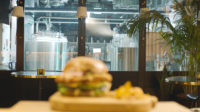What would happen if you could freeze more types of food, for longer periods of time?
EverCase, a new, patented technology that keeps food as cold as -10 degrees Celsius without actually freezing it solid, says it could have the answer: no freezer burn and reduced food waste for consumers, retailers and manufacturers.
Motivated by using thermodynamics to prevent food waste and testing the limits of freezing, the proprietary super-cooling technology uses electric and magnetic fields to preserve perishable materials at below-freezing temperatures without formation of ice crystals. It was researched and developed over nine years by Dr. Soojin Jun, a professor of food sciences at University of Hawaii.
EverCase aims to “disrupt freezing” – particularly in the commercial and retail spaces – providing extra shelf life in an effort to cut food waste and boost bottom lines, allowing companies “backend relief” on shrinkage, spoilage and transportation time.
“We talk about a cold supply chain but it’s actually a cold supply clock in my view. It has applications all the way along the cold supply chain,” said Paul Levins, co-founder of EverCase. Levins and his partner, Chris Somogyi, helped Jun take nine years of research at the university to market. The project was incubated at Xerox’s PARC (Palo Alto Research Center).
“We tend to think of the food waste that’s in our trash – but it’s actually much worse than that – it’s actually all of the resources that make that food – so the water, fertilizer, acres of land, the effort, the transport. If food waste were a country, it would be the third-largest emitter of greenhouse gasses in the world,” Levins said. “We think of EverCase as freezing 3.0. In much the same way freezing has become ubiquitous across the cold supply chain, so will this, because everywhere there’s an opportunity for freezing, there’s an opportunity for EverCase.”
The technology went through nearly 20 prototypes and the research has been peer reviewed, Levins said.
Since water in food is diamagnetic and also consists of dipole molecules which tend to realign and re-orientate, the applied electric and magnetic fields directly act upon water to prevent ice nucleation and promote super cooling during the freezing process. Super-cooled foods can be maintained in their natural state for weeks.
“The electric and magnetic fields intervene between the freezing temperature and the food. What these two fields do is effectively keep the water molecules in very small amounts of agitation so they can’t completely slow down, and, in consequence ice never forms,” Levins said
EverCase was selected as one of just a handful of applicants out of over 700 applicants for last month’s South by Southwest (SXSW) Pitch, a two-day showcasing new tech to a panel of industry experts, media, venture capitalists and angel investors.
“Our category was the Innovative World category so it was great to be in that league. The amount of eyes it puts on you is extraordinary,” Levins said. “You have three minutes to present and then there’s six minutes of questions from judges after so it’s a bit nerve wracking.”
The company’s target audiences include food industries like fish and seafood, cold warehouse and food distributors, and eventually, commercial appliances. For example, EverCase has developed a retail display case that can be used as point-of-sale and as back-of-store operations, to extend shelf and reduce loss from spoilage.
They are “testing the limits of freezing,” Levins said.
“Do we want a future where we produce more, only to waste more, or do we want where we focus on trying to better preserve what we have now?” he said. “The price of producing a lot of food doesn’t have to be a lot of waste.”








